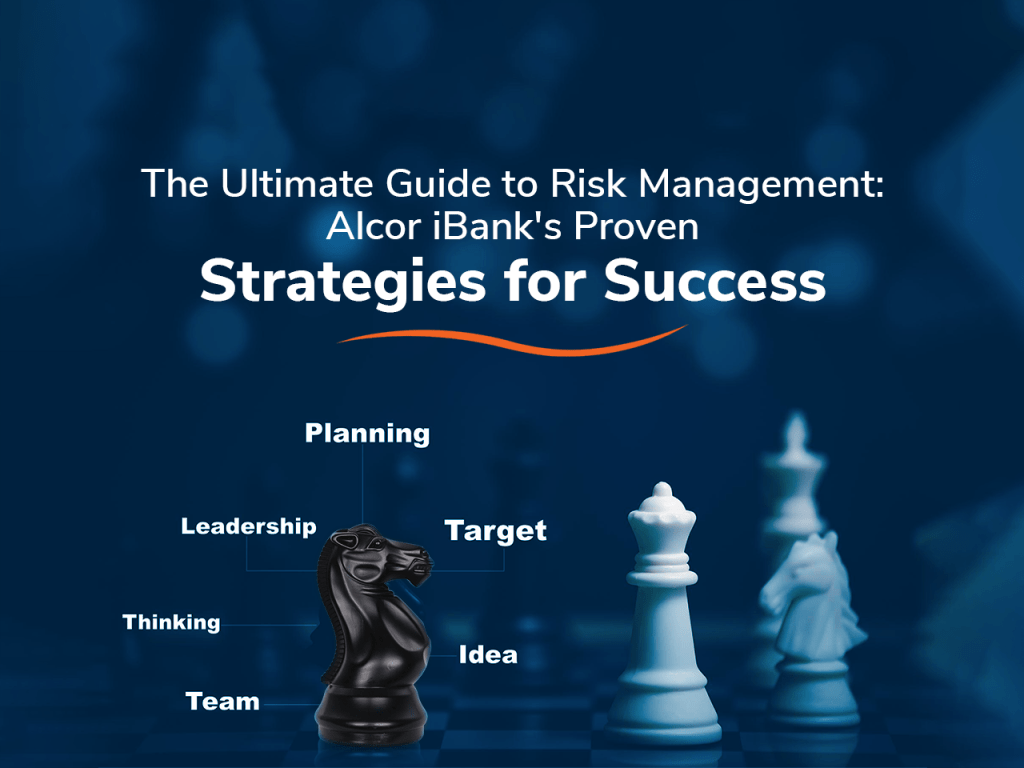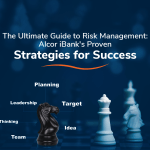Introduction: The Crucial Role of Risk Management in Finance
In the dynamic landscape of the finance industry, the concept of risk management stands as a sentinel, guarding against uncertainties and potential pitfalls. At its core, risk management is the proactive process of identifying, assessing, and mitigating potential threats that could impact financial stability. In an environment where markets fluctuate, regulations evolve, and unforeseen events occur, effective risk management becomes not just a strategy but a necessity.
Financial institutions, including Alcor iBank, recognize that navigating the complex and interconnected web of risks is paramount to sustaining success and ensuring the security of their clients’ assets. The importance of risk management in finance extends beyond compliance; it is a strategic imperative that empowers organizations to make informed decisions, optimize performance, and fortify themselves against unforeseen challenges.
By understanding and embracing the significance of risk management, financial institutions position themselves as guardians of their clients’ financial well-being. This proactive approach not only enhances resilience in the face of adversity but also opens avenues for sustainable growth and prosperity. As we delve deeper into Alcor iBank’s proven strategies for effective risk management, we embark on a journey to unveil the integral role played by this discipline in shaping a robust and secure financial future.
Alcor iBank’s Commitment to Effective Risk Management
In the ever-evolving landscape of the financial industry, Alcor iBank stands as a beacon of trust and innovation, committed to safeguarding the financial interests of its clients. At the heart of this commitment lies a proactive and strategic approach to risk management – an approach that goes beyond conventional practices to deliver unparalleled security and resilience.
Alcor iBank recognizes that the financial journey is fraught with uncertainties, from market fluctuations to regulatory changes and unforeseen global events. With an unwavering dedication to providing cutting-edge solutions, Alcor iBank has emerged as a leader in the realm of risk management. The institution’s commitment extends beyond mere compliance; it is a promise to empower clients with the knowledge and tools needed to navigate the complexities of the financial world.
As we delve into Alcor iBank’s proven strategies, it becomes evident that our commitment to effective risk management is not just a service; it’s a philosophy woven into the fabric of our operations. By staying ahead of the curve, anticipating challenges, and leveraging innovative methodologies, Alcor iBank ensures that clients not only weather storms but also thrive in the midst of uncertainty.
Join us on a journey through the corridors of Alcor iBank’s dedication to providing effective risk management strategies, where every client’s financial security is not just a priority but a testament to a promise kept.
Understanding Risk Management
Risk management is the systematic process of identifying, assessing, and mitigating potential threats to achieve financial stability and protect assets. It involves analyzing uncertainties in the dynamic financial landscape, implementing strategies to minimize adverse impacts, and ensuring sustainable growth.
In the finance industry, where volatility and unpredictability are constants, effective risk management is paramount. It empowers organizations, like Alcor iBank, to make informed decisions, optimize performance, and secure clients’ financial interests. Beyond compliance, it is a strategic imperative that enhances resilience, fosters trust, and fortifies against unforeseen challenges, ensuring a robust and secure financial future.
The Evolving Landscape of Financial Risks
The financial landscape is a dynamic ecosystem shaped by an array of ever-evolving risks. As global markets interconnect and technology reshapes traditional norms, new dimensions of financial risk emerge. Market volatility, a perennial factor, is accentuated by geopolitical uncertainties, economic downturns, and rapid technological advancements. The proliferation of digital transactions introduces cyber threats, amplifying operational and security risks. Regulatory changes, a constant in financial environments, add layers of complexity, demanding adaptability from institutions.
Financial innovation introduces opportunities but concurrently ushers in novel risks. Cryptocurrencies, for example, bring market risks, regulatory uncertainties, and technological vulnerabilities. Additionally, the rise of fintech disruptors poses challenges to traditional financial institutions, necessitating a delicate balance between embracing innovation and managing associated risks.
The evolving landscape of financial risks demands a comprehensive and adaptive risk management approach. Institutions like ours play a pivotal role in anticipating, understanding, and mitigating these multifaceted risks. They must not only fortify against known threats but also remain agile in the face of the unknown, ensuring the resilience and longevity of financial systems in an ever-changing environment.
Alcor iBank’s Perspective on the Importance of Proactive Risk Management
Alcor iBank’s perspective on proactive risk management is rooted in a fundamental understanding: in the dynamic realm of finance, waiting for challenges to unfold is a strategy fraught with peril. We firmly believe that embracing a proactive stance is not merely a prudent approach but a strategic imperative for sustainable success.
For Alcor iBank, proactive risk management is a preemptive measure, a forward-looking strategy that identifies potential threats before they materialize into significant challenges. This approach empowers the institution to anticipate market shifts, regulatory changes, and emerging risks, allowing for timely adjustments and informed decision-making.
The importance of proactive risk management, according to Alcor iBank, extends beyond compliance checkboxes. It is a means to foster resilience, build client trust, and stay ahead in a competitive landscape. By staying vigilant, Alcor iBank aims not only to protect the financial interests of its clients but also to position itself as a leader capable of navigating uncertainties with agility and foresight.
In essence, Alcor iBank’s perspective underscores the transformative power of being proactive in risk management. By anticipating and mitigating risks before they escalate, the institution aims to create a financial environment characterized by stability, adaptability, and a commitment to the long-term prosperity of its clients.
Key Elements of a Robust Risk Management Framework
Identification of potential risks
Alcor iBank employs a meticulous process for the identification of potential risks, recognizing that a comprehensive risk management strategy begins with a thorough understanding of the landscape. The institution systematically scans the financial environment, employing both quantitative and qualitative methods to pinpoint potential threats.
- Market Risks
- Alcor iBank closely monitors market dynamics, identifying fluctuations in interest rates, currency values, and asset prices.
- This involves sophisticated analysis and scenario planning to anticipate market-driven uncertainties.
- Operational Risks
- The institution assesses its internal processes, technology infrastructure, and human factors to identify operational vulnerabilities.
- By scrutinizing day-to-day operations, Alcor iBank ensures resilience against disruptions and errors.
- Credit Risks
- Through rigorous credit analysis, Alcor iBank evaluates the creditworthiness of borrowers and counterparties.
- This proactive approach helps mitigate the impact of default or adverse credit events.
- Strategic Risks
- A proactive examination of strategic initiatives and business decisions is integral.
- Alcor iBank assesses the potential impact of strategic choices, ensuring alignment with organizational goals and adaptability to changing market conditions.
- Reputational Risks
- Recognizing the significance of reputation, Alcor iBank monitors external perceptions and social media channels.
- Swift identification of factors that may affect reputation allows for timely responses and reputation protection measures.
Alcor iBank’s commitment to the identification of potential risks is not a one-time effort but an ongoing, dynamic process. By leveraging a multifaceted approach, the institution remains poised to address challenges before they escalate, ensuring a resilient and secure financial environment for its clients.
Assessment and Prioritization of Risks
Alcor iBank’s approach to risk management extends beyond identification; it involves a strategic process of assessment and prioritization to allocate resources effectively and address the most critical risks. This methodology ensures a focused response, aligning with the institution’s commitment to proactive risk mitigation.
- Quantitative Assessment
- Alcor iBank employs quantitative methods to assign numerical values to potential risks, considering factors such as financial impact, probability of occurrence, and historical data. This data-driven approach allows for a systematic comparison of risks.
- Qualitative Assessment
- In tandem with quantitative analysis, Alcor iBank recognizes the importance of qualitative evaluation.
- This involves a nuanced examination of contextual factors, industry trends, and expert judgment to provide a holistic understanding of risks that may not be fully captured by numerical models.
- Scenario Analysis
- The institution conducts scenario analysis to simulate various potential risk scenarios.
- By modeling different outcomes, Alcor iBank gains insights into the potential impact of risks under different conditions, aiding in informed decision-making and strategy development.
- Risk Prioritization
- Alcor iBank prioritizes risks based on their potential impact and likelihood of occurrence.
- Risks with higher severity and probability are given precedence in resource allocation and mitigation efforts, ensuring a targeted and efficient risk management strategy.
- Alignment with Business Objectives
- The assessment process at Alcor iBank is closely tied to the institution’s overarching business objectives.
- Risks are evaluated not only in isolation but in relation to their potential impact on strategic goals, allowing for a more focused response that aligns with the institution’s mission and vision.
By systematically assessing and prioritizing risks, Alcor iBank ensures that resources are directed toward the most critical areas, fostering a resilient and adaptive risk management framework. This dynamic and strategic approach enables the institution to navigate uncertainties with agility, safeguarding the interests of its clients and maintaining a robust financial environment.
Strategies for Effective Risk Mitigation
Alcor iBank employs a multifaceted and proactive approach to risk mitigation, recognizing that successful risk management goes beyond identification and extends to the implementation of strategic measures. The institution leverages a range of strategies to mitigate risks and ensure the stability and security of its financial operations.
- Diversification of Portfolios
- Alcor iBank strategically diversifies investment portfolios to spread risk across different assets and sectors.
- This approach minimizes the impact of adverse events in any single area, enhancing overall portfolio resilience.
- Continuous Monitoring and Surveillance
- The institution maintains a robust monitoring system, employing advanced analytics and real-time surveillance tools.
- This allows for the early detection of anomalies or deviations from expected patterns, enabling swift corrective action.
- Stress Testing
- Alcor iBank conducts rigorous stress tests to assess the resilience of its financial structures under extreme scenarios.
- By simulating adverse conditions, the institution identifies vulnerabilities and strengthens its capacity to withstand unexpected shocks.
- Scenario Planning and Contingency Plans
- The institution develops comprehensive scenario plans and contingency measures to address potential risks.
- By pre-emptively outlining response strategies, Alcor iBank ensures a rapid and effective reaction to unforeseen events.
- Adaptive Technology Infrastructure
- Alcor iBank invests in cutting-edge technology to fortify its cybersecurity measures.
- This includes regular updates to systems, robust encryption protocols, and advanced threat detection mechanisms to mitigate operational and cyber risks.
By integrating these strategies into its risk management framework, Alcor iBank demonstrates a commitment to not only identifying and assessing risks but actively mitigating them. This proactive approach enhances the institution’s ability to navigate the complex and dynamic financial landscape, safeguarding the interests of its clients and maintaining a resilient and secure financial environment.
Proven Strategies for Effective Risk Management
Successful Risk Management Strategies
Alcor iBank has distinguished itself through the implementation of a comprehensive set of successful risk management strategies, acknowledging that effective risk mitigation is crucial in the ever-evolving financial landscape. These strategies encompass a proactive and adaptive approach to identify, assess, and address risks, ensuring the institution’s resilience and the safeguarding of client interests.
- Integrated Risk Culture
- Alcor iBank fosters a risk-aware culture across all levels of the organization.
- Employees are not only educated on potential risks but are also encouraged to actively participate in risk management initiatives.
- This integrated approach ensures that risk considerations are ingrained in day-to-day operations.
- Dynamic Risk Assessments
- The institution conducts continuous risk assessments, adapting to changes in the financial environment.
- By staying abreast of market trends, regulatory shifts, and technological advancements, Alcor iBank can swiftly identify emerging risks and adjust its strategies accordingly.
- Holistic Portfolio Management
- Alcor iBank employs a holistic approach to portfolio management, combining diversification strategies with active monitoring.
- This ensures that the investment portfolio remains resilient in the face of market fluctuations and sector-specific risks.
- Strategic Partnerships
- Collaborative efforts with industry experts, regulatory bodies, and technology partners strengthen Alcor iBank’s risk management framework.
- These strategic partnerships provide valuable insights, enhance regulatory compliance, and facilitate the adoption of innovative risk mitigation solutions.
- Scenario-Based Planning
- Alcor iBank utilizes scenario-based planning to simulate various market conditions and potential crises.
- By stress-testing its systems and strategies, the institution can identify vulnerabilities, refine response plans, and enhance overall preparedness for unforeseen events.
By weaving these successful risk management strategies into its operational fabric, Alcor iBank not only navigates the intricacies of the financial landscape but also establishes itself as a proactive and resilient institution. The commitment to innovation, collaboration, and client-centricity ensures that Alcor iBank remains at the forefront of effective risk management in the financial industry.
Practical Tips for Implementing Proven Strategies in Various Financial Scenarios
Implementing proven risk management strategies in various financial scenarios requires a nuanced and adaptable approach. Alcor iBank offers practical tips to guide organizations through the application of these strategies in diverse situations:
- Customization for Industry Specifics
- Tailor risk management strategies to the unique characteristics of your industry.
- Different sectors face distinct challenges, and a one-size-fits-all approach may not be effective.
- Consider the specific regulatory landscape, market dynamics, and operational nuances relevant to your industry.
- Continuous Training and Awareness
- Invest in ongoing training programs to keep your team abreast of the latest risk management practices.
- Foster a culture of awareness and vigilance, ensuring that employees at all levels understand their role in mitigating risks and are equipped to adapt to evolving financial scenarios.
- Real-Time Data Analytics
- Leverage real-time data analytics to enhance your risk monitoring capabilities. Implement advanced analytics tools that can swiftly detect anomalies, assess market trends, and provide actionable insights.
- This real-time data-driven approach allows for prompt decision-making in dynamic financial environments.
- Collaboration with Industry Peers
- Engage in collaborative efforts with industry peers to share insights and best practices.
- Participate in forums, conferences, and industry associations to stay informed about emerging risks and proven strategies employed by other organizations facing similar challenges.
- Regular Risk Audits
- Conduct regular risk audits to evaluate the efficiency of your risk management framework.
- Independent audits provide an objective assessment of your strategies, ensuring that they remain aligned with organizational goals and industry standards.
By incorporating these practical tips, organizations can enhance their ability to implement proven risk management strategies across various financial scenarios. Alcor iBank emphasizes the importance of adaptability, collaboration, and a proactive mindset to navigate the complexities of the ever-changing financial landscape successfully.
Financial Security Tips from Alcor iBank
Alcor iBank is committed to providing clients with sound recommendations for ensuring financial security. These recommendations encompass a holistic approach that addresses various facets of personal and business finance. Here are Alcor iBank’s key recommendations:
- Comprehensive Financial Planning
- Engage in thorough financial planning that considers short-term and long-term goals.
- Evaluate income, expenses, and savings to create a personalized financial roadmap.
- Continuously reassess and adjust the plan as circumstances change.
- Diversified Investment Portfolio
- Build a diversified investment portfolio to spread risk across different asset classes.
- Consider a mix of stocks, bonds, real estate, and other investment vehicles.
- Regularly review and rebalance the portfolio to align with financial goals and market conditions.
- Emergency Fund Establishment
- Establish and maintain an emergency fund to cover unexpected expenses.
- Aim for three to six months’ worth of living expenses in a liquid, easily accessible account.
- This fund acts as a financial safety net during unforeseen circumstances.
- Debt Management
- Manage and reduce high-interest debt to alleviate financial strain.
- Prioritize paying off debts strategically, starting with high-interest obligations.
- Avoid accumulating unnecessary debt and consider debt consolidation if beneficial.
- Cybersecurity Measures
- Implement robust cybersecurity measures to protect against online threats and fraud.
- Use secure and unique passwords, enable two-factor authentication, and stay vigilant against phishing attempts.
- Regularly update software and applications to enhance digital security.
Alcor iBank emphasizes that financial security is a dynamic and evolving process. By following these recommendations and maintaining a proactive and adaptive mindset, individuals and businesses can work towards building a secure financial future. Regular consultation with financial advisors at Alcor iBank further enhances the effectiveness of these recommendations by tailoring them to each client’s unique financial situation and goals.
Conclusion
In navigating the intricate landscape of finance, Alcor iBank underscores the importance of proactive risk management, offering a dynamic set of strategies. From diversified portfolios to cybersecurity measures, the institution advocates for a comprehensive approach that addresses the multifaceted nature of financial security. Key facets include robust financial planning, diversified investments, emergency funds, and staying abreast of cybersecurity challenges.
Embarking on a journey towards financial success requires diligence and strategic planning. Alcor iBank encourages readers to not merely absorb these strategies but to actively implement them. By integrating these recommendations into their financial practices, individuals and businesses can fortify their fiscal foundations, navigate uncertainties with confidence, and work towards achieving enduring financial success.





